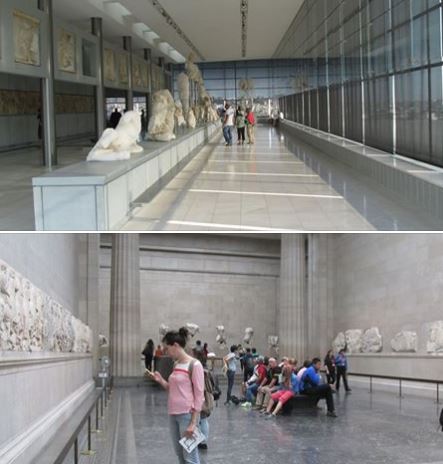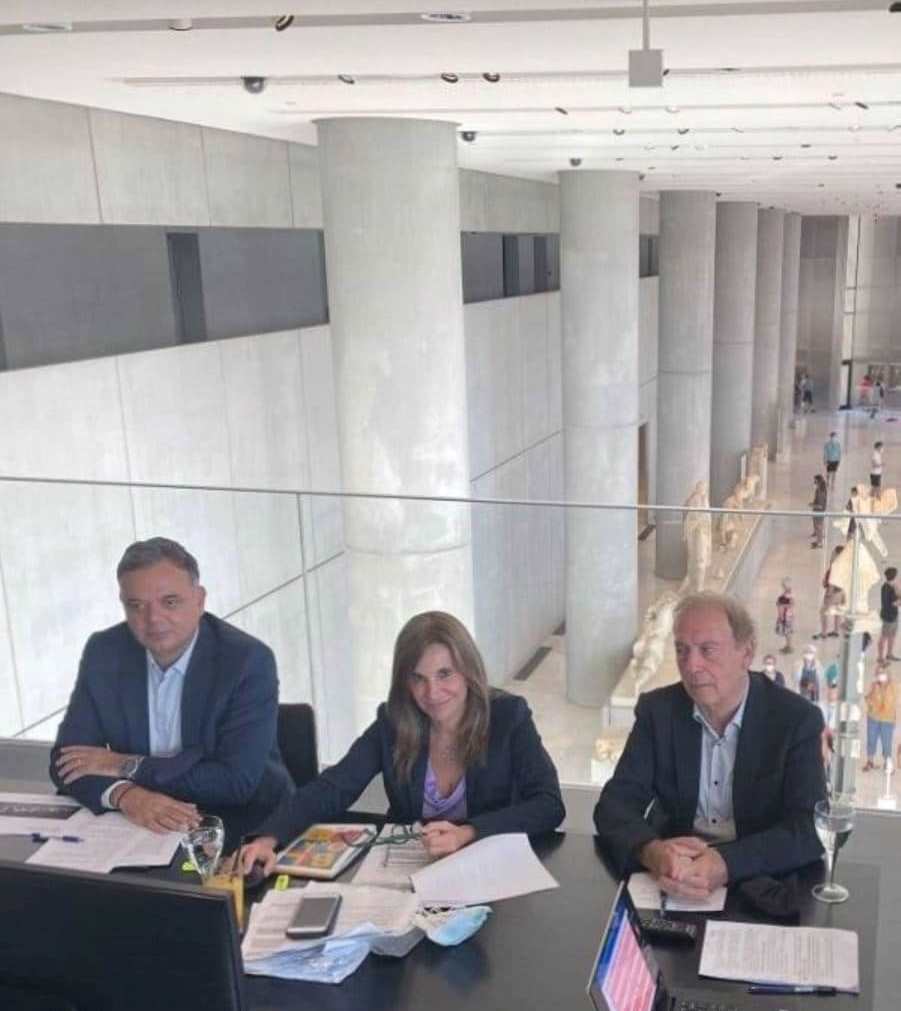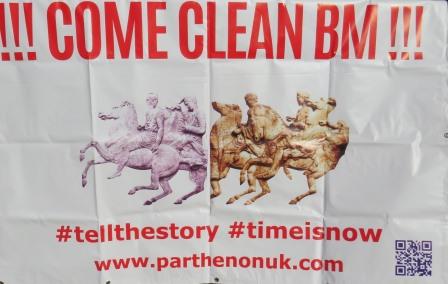“We disagree with UNESCO's decision; the Parthenon Sculptures were acquired legally“, UK government says in a Ta Nea aricle written by Yannis Andritsopoulos, 07 October 2021.
The British government has said that it will not abide by a recent UNESCO decision on the Parthenon Marbles also insisted that “the Parthenon Sculptures were acquired legally” and rejected UNESCO’s call to reconsider its position and to negotiate with Greece on the return of the 2,500-year-old cultural treasures.
Speaking to Greek newspaper Ta Nea, a government spokesperson said that the UK government “disagrees” with the decision, adding that it intends to challenge it before UNESCO.
The response came after the UNESCO’s Intergovernmental Committee for Promoting the Return of Cultural Property (ICPRCP) voted unanimously for the first time at its 22nd session to include the return of the Parthenon Marbles in its decision document, marking a major step forward since Greece first introduced the request to the meeting’s agenda in 1984.
ICPRCP’s decision says that Greece’s request for the return of the Parthenon Sculptures is "legitimate and rightful" and calls on Britain "to reconsider its stand and proceed to a bona fide dialogue with Greece on the matter".
Most importantly, the Committee acknowledges for the first time that "the case has an intergovernmental character and, therefore, the obligation to return the Parthenon Sculptures lies squarely on the UK Government."
This is in stark contrast to the UK government’s assertion that it is for the British Museum, not the government, to discuss the issue and make decisions related to it.
“We disagree with the Committee’s decision adopted in the closing minutes of the session and are raising issues relating to fact and procedure with UNESCO,” a UK government spokesperson told Ta Nea.
“Our position is clear—the Parthenon Sculptures were acquired legally in accordance with the law at the time. The British Museum operates independently of the government and free from political interference. All decisions relating to collections are taken by the Museum’s trustees,” the spokesperson added.
A British Museum spokesperson told Ta Nea that “the Trustees of the British Museum have a legal and moral responsibility to preserve and maintain all the collections in their care,” adding that “the Parthenon Sculptures are an integral part of (the Museum’s collection) story and a vital element in this interconnected world collection”.
Greece insists that it is the rightful owner of the Parthenon Marbles. The Greek government says that the sculptures were illegally removed from the Parthenon during the Ottoman occupation of Greece in the early 1800s.
In his first interview with a European newspaper since becoming the UK’s prime minister, Boris Johnson dashed Greece’s hopes of getting the Marbles back, telling Greek daily Ta Nea that they were “legally acquired by Lord Elgin under the appropriate laws of the time and have been legally owned by the British Museum’s Trustees since their acquisition.”
The British Museums’ comment to Ta Nea in full:
“The British Museum has a long history of collaboration with UNESCO and admires and supports its work. The Trustees of the British Museum have a legal and moral responsibility to preserve and maintain all the collections in their care and to make them accessible to world audiences. The Trustees want to strengthen existing good relations with colleagues and institutions in Greece, and to explore collaborative ventures directly between institutions, not on a government-to-government basis. This is why we believe that working in partnership across the world represents the best way forward. Museums holding Greek works, whether in Greece, the UK or elsewhere in the world, are naturally united to show the importance of the legacy of ancient Greece. The British Museum is committed to playing its full part in sharing the value of that legacy.
“The Museum takes its commitment to be a world museum seriously. The collection is a unique resource to explore the richness, diversity and complexity of all human history, our shared humanity. The strength of the collection is its breadth and depth which allows millions of visitors an understanding of the cultures of the world and how they interconnect – whether through trade, migration, conquest, conflict, or peaceful exchange.
“The Parthenon Sculptures are an integral part of that story and a vital element in this interconnected world collection, particularly in the way in which they convey the influences between Egyptian, Persian, Greek and Roman cultures. We share this collection with the widest possible public, lending objects all over the world and making images and information on over four million objects from the collection available online.
“The approach of the Acropolis Museum and the British Museum are complementary: the Acropolis Museum provides an in-depth view of the ancient history of its city, the British Museum offers a sense of the wider cultural context and sustained interaction with the neighbouring civilisations of Egypt and the Near East which contributed to the unique achievements of ancient Greece”.
Britain had previously rejected Greece’s request to hold talks on returning the Marbles after Athens proposed a meeting between experts from the two countries.

Unanimous adoption five minutes before the end of the meeting
Yannis Andritsopulos of Ta Neawrites that the decision of the 22nd Session of the Intergovernmental Committee of UNESCO, the ICPRCP was taken with the efforts of the behind-the-scenes diplomatic steps taken by Greece. The Zambia delegation introduced COM 17 to the plenary at the end of the Summit and the decision was adopted unanimously. Despite subsequent protests from the British side, due process had been followed throughout the proceedings of this session, a Greek government source told the "Ta Nea". The President of this Session of the ICPRCP read out the full text of the decision and asked its members four times if there are any objections. There was none.
To listen to the 22nd Session of the ICPRCP, follow the link here.
Greece was represented at the 22nd Session of the ICPRCP by the Secretary General of the Ministry of Culture Georgios Didaskalou, the new General Director of the Acropolis Museum Nikolaos Stampolidis, the Director of the department for the protection of cultural property of the Ministry of Culture Vasiliki Papageorgiou and the legal advisor of the Ministry of Foreign Affairs Artemis Papathanassiou. Greece exerted pressure for the decision on the issue to be finalised. "Although Britain does not accept dialogue, Greece continues to ask for this and on this occassion we asked the committee to do something more," added the Ministry of Foreign Affairs reprsentative, Ms Papathanassiou with the ICPRCP President accepting her request for the drafting of a decision to be adopted by the Comittee.

Greece was represented at at the 22nd Session of the ICPRCP by the Secretary General of the Ministry of Culture Georgios Didaskalou, the new General Director of the Acropolis Museum Nikolaos Stampolidis, the Director of the department for the protection of cultural property of the Ministry of Culture Vasiliki Papageorgiou and the legal advisor of the Ministry of Foreign Affairs Artemis Papathanassiou.
"We congratulate Greece on this excellent result and hope that Britain will finally review its stance and engage in dialogue. At some point, the day will come when we will see the Sculptures reunited in the Acropolis Museum," commented Dr Christiane Titgat, president of the International Association for the Reunification of the Parthenon Sculptures (IARPS).

Dr Christiane Tytgat, President of the International Association for the Reunification of the Parthenon Sculptures (IARPS)
BCRPM observations, 07 October 2021.
Wednesday 06 October 2021, saw the final day of the Conservative Party Conference at Manchester Central Convention Complex.Prime Minister Johnson's speech included his take on how to conserve British heritage and culture:
"It has become clear to me that this isn’t just a joke – they really do want to rewrite our national story, starting with Hereward the Woke. We really are at risk of a kind of know-nothing cancel culture, know-nothing iconoclasm. We Conservatives will defend our history and cultural inheritance not because we are proud of everything, but because trying to edit it now is as dishonest as a celebrity trying furtively to change his entry in Wikipedia, and it’s a betrayal of our children’s education."
A reminder that goblal Britain can only claim to be global by being omnipotent? History doesn't have to be rewitten but it has to told as a whole story. And we come back to BCRPM's 20 June protest outside the British Museum, with a poster asking the BM to come clean. Janet Suzman wrote:
' NOT explaining the full story of these Marbles, and is not worthy of such an august institution. Each case should be considered on its merits since each case is different. The Marbles case is unique.
The BM's Director, Hartwig Fischer, has developed a defensive trope about separation being a 'creative act'. Well, he would, wouldn’t he? The Marbles are one of the BM's star attractions.
The Rodin show a few years ago re-inforced the marbles' supremacy in execution and their diminished meaning in isolation. Imagine one of Rodin’s great figures from the group called The Burghers of Calais standing separated from its fellows in a far country? That would hardly be a ‘creative act’.
The BM is a great encyclopaedic institution while being an Aladdin's Cave of conquest. Imperial Britain took objects from other countries because it could.
But there's a mood abroad which abhors colonialist attitudes and entitlement that it must wake up to.'
For more on the 20 June 2021 protest follow, the link here.
